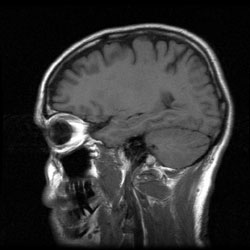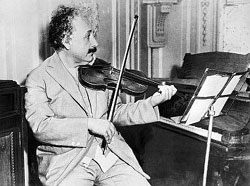0






|
NoteAhang
The Iranian Virtual Music Society |


| Thumbs Up/Down |
| Received: 309/2 Given: 138/1 |


Classical music affects the brain’s organization and abilities, through its melody and rhythm. The rhythm raises the level of serotonin produced in your brain. Serotonin is a neurotransmitter, involved in the transmission of nerve impulses that helps maintaining joyous feelings. When the brain produces serotonin, tension is eased. In fact depression is a consequence of the scarce production of this hormone. Serotonin is released when the brain is “positively shocked”. For instance: if we look at a splendid painting, smell a delicious scent, feel an extraordinary sensation, eat something delicious or listen to some charming music, then the brain lets off a certain amount of serotonin which arouses and maximizes pleasant feelings. Music’s rhythm can also stimulate other natural cadencies of the body, resembling the heartbeat, or the Alfa-rhythm of the brain, and this effect is used to counter the development of clinical depression. The melody instead, is the “sparkle” that catalyses the creative process in our minds.
The peculiarity of music is that while poetry and the literature must rely on the rational transport to inspire an emotion, since they are mediated from words, music omits this stage and points directly to stage of communicating emotions. Music does not pass through rationality to express its essence, it crosses right to our emotions.
Through generating a sequence of different emotions, listening to certain music can give a different base to your thoughts, words, and actions. It will intensify enjoyment and alleviation, encourage the crestfallen spirits, and assuage the turbulent ones. Depending from the listener and the music, this effect will last for how long you want it to last.
The known effects of music on the brain are varied: music affects from humans’ and animals’ brains to plants’ development. In humans, music enhances spatial IQ, by increasing the short and long - term memory. In fact, musical trained musicians perform better on word memory tests than other adults. Children benefit from classical music’s virtues even more than adults; they experience advantages in cognitive skills. Animals and plants as well have proven a certain predisposition towards classical music. Just listening to this musical style enhances the brain’s ability; playing it, results even in a major brain development.
برای بهتر زندگی کردن باید بهتر دید ...!!!!

| Thumbs Up/Down |
| Received: 309/2 Given: 138/1 |


...
brain biography

برای بهتر زندگی کردن باید بهتر دید ...!!!!

| Thumbs Up/Down |
| Received: 309/2 Given: 138/1 |


The commonly known “Mozart effect” is a phenomena that suggests the improvement on the performance of spatio-temporal reasoning and short- term memory through the listening of complex music, such as Mozart’s two-piano concertos. Music, especially the one from the “baroque” period with 60 beats per minute beat pattern, affects the amplitude and frequency of brain waves, measurable through and electro – encephalogram. Music also affects breathing rate and electrical resistance of the skin, as result of the influence on the Hormone system. This brings the pupils to dilate, and an increase in blood pressure and heart rate. This allows the brain to concentrate more easily, and to assimilate more information in less time. This happens because music stimulates the left and right hemispheres of the brain at same moment. The contemporaneous activation of the two lobes boosts learning and information intake, therefore augmenting cognitive skills. It has been proven that learning may be increased to at least fivefold, through the using of this musical style. It is for this reason that story tellers in the middle ages sang out their tails; in order to remember the narrations consisting of more than a thousand of lines. Greek dramatists based their selves on the same principle to memorize long soliloquies.
Melody and rhythm are the two essential components of music that work in very different ways: melody is the essence that boosts creative reasoning, while rhythm synchronizes these emotions with the vital patterns. Human beings have since long been tied to particular musical cadences. The rhythms in the heart-beat, walking, jumping, speaking, chewing, and breathing all represent essential regular patterns in our quotidian life. It is this particular musical rhythm that increases the level of serotonin produced in the brain, therefore enhancing critical thinking. What makes this music so valuable is the rigorous mathematical order it complies.

برای بهتر زندگی کردن باید بهتر دید ...!!!!

| Thumbs Up/Down |
| Received: 309/2 Given: 138/1 |


The commonly known “Mozart effect” is a phenomena that suggests the improvement on the performance of spatio-temporal reasoning and short- term memory through the listening of complex music, such as Mozart’s two-piano concertos. Music, especially the one from the “baroque” period with 60 beats per minute beat pattern, affects the amplitude and frequency of brain waves, measurable through and electro – encephalogram. Music also affects breathing rate and electrical resistance of the skin, as result of the influence on the Hormone system. This brings the pupils to dilate, and an increase in blood pressure and heart rate. This allows the brain to concentrate more easily, and to assimilate more information in less time. This happens because music stimulates the left and right hemispheres of the brain at same moment. The contemporaneous activation of the two lobes boosts learning and information intake, therefore augmenting cognitive skills. It has been proven that learning may be increased to at least fivefold, through the using of this musical style. It is for this reason that story tellers in the middle ages sang out their tails; in order to remember the narrations consisting of more than a thousand of lines. Greek dramatists based their selves on the same principle to memorize long soliloquies.
Melody and rhythm are the two essential components of music that work in very different ways: melody is the essence that boosts creative reasoning, while rhythm synchronizes these emotions with the vital patterns. Human beings have since long been tied to particular musical cadences. The rhythms in the heart-beat, walking, jumping, speaking, chewing, and breathing all represent essential regular patterns in our quotidian life. It is this particular musical rhythm that increases the level of serotonin produced in the brain, therefore enhancing critical thinking. What makes this music so valuable is the rigorous mathematical order it complies.

برای بهتر زندگی کردن باید بهتر دید ...!!!!

| Thumbs Up/Down |
| Received: 309/2 Given: 138/1 |


We can describe the effect of classical music on the brain being composed of two effects that act in synergy. The first is due to rhythm, that synchronizes with the body’s vital rhythms, already mentioned, and produces the proper mood for increased cognitive and creative capabilities. The second effect that acts in synergy with the first is melody, that gets along with thoughts resolutions and gives to the person the warm feeling that he or she is able to tackle new challenges, by setting a path in the invention of new solutions and providing the ability to make the correct choice among possible solutions. Melody and rhythm, together, act in synergy with the brain; it “opens” the auditory and sensorial channels that conduct to the brain, thus benefiting your cerebral skills.
The rigorous order of the music from the baroque and classical periods causes the brain to experience more serotonin release, letting the body and mind perform better when listening to these logical compositions. This order includes specific patterns in rhythm and pitch, character contrast, repetitions, and alterations of the theme. Modern music doesn’t provide the right balance of rhythm and melody, thus not sorting the correct effect on a person’s brain.
It is the beat that establishes the crucial effect of music on our body, together with the enhancement of cognitive and creative functions of the brain, supported from the right melody. For instance, when an autistic boy is asked to tie his shoes, this task results very difficult and perhaps impossible. But when he is asked to do it with classical music in the background, he is successful in achieving his task. According to the Mozart Effect, children who take music lessons will experience advantages in cognitive skills.

برای بهتر زندگی کردن باید بهتر دید ...!!!!

| Thumbs Up/Down |
| Received: 309/2 Given: 138/1 |


Music affects different people in diverse manners: while Handel’s Water Music will totally displace a particularly cognizant musician’s thoughts, it might only be pleasant to someone else who isn’t a musician nor music enthusiast. An observing person is more keen to discern all the sensations that the composer (and orchestra/musician) transmits through his music, than an idle listener. The level of musicianship of the listener is crucial; so the same piece could appear absolutely different to two listeners, and this is how two opinions of a piece contradict their selves.
Effects of music have been proven on animals and plants as well. The right balance of rhythm and melody help hens lay more eggs, cats to relax, and cows to produce more milk. An experiment on laboratory rats revealed that mammals have a natural predisposition towards music. The experiment consisted in placing two boxes, connected by a tube, playing Bach’s Air on the G string in one box, and rock music in the other. Most rats chose to go in the box with Bach’s music, even when the music switched from a box to another. Later, the rats were placed in a maze, and the ones which chose Bach’s music, found the exit before, and more easily than the ones which were exposed to rock music. When scientists then observed the rats’ brains, they could see that the ones being frequently exposed to classical music, had a physically more developed brain than the ones who were not being exposed to the particular music. Experiments on plants proved that plants growing with the 60 beats per minute pattern, grew faster and more efficiently than the ones growing with rock music in the background; the ones being exposed to rock music withered and died. Plants are living but not thinking organisms, therefore what matters for their development is not the melody, but the rhythm of the music.
The powerful effects of music are fundamental in life, and its beneficiaries always appear to perform better in life. Most of the greatest minds in history were musicians, or compelled music’s power. Einstein, one of the most brilliant minds in history was a violinist, and admitted that one of the reasons why he was so smart was because he played the violin. He found solutions to complex equations and problems by improvising on the violin. When Thomas Jefferson couldn’t find the correct wording for a passage in the Declaration of Independence, he played his violin, and found the correct wording. Music helped him to project the words from mind to paper. Conan Doyle made his superlative character Sherlock Holmes play the violin when he was to solve a particularly complex case. Great men of history, from Shakespeare to Napoleon were in some way dedicated to music, and this is what made the difference; music.

برای بهتر زندگی کردن باید بهتر دید ...!!!!

| Thumbs Up/Down |
| Received: 6/0 Given: 0/0 |


cool! so i guess this answers the question about musicZ advantages n disadvantages
خوابیدی بدون لالایی و قصه, بگیر اسوده بخواب بی درد و غصه...

| Thumbs Up/Down |
| Received: 309/2 Given: 138/1 |


what?
why?
برای بهتر زندگی کردن باید بهتر دید ...!!!!

| Thumbs Up/Down |
| Received: 6/0 Given: 0/0 |


um i think there was a topic bout the „disadvantages” of music, and almost all the responses were positive but no one could really explain and give proof, so now we have this article to prove our point!
خوابیدی بدون لالایی و قصه, بگیر اسوده بخواب بی درد و غصه...

| Thumbs Up/Down |
| Received: 2/0 Given: 2/0 |


But i think all of spots thats pointed in top article was advantages of music on human brain
exept the influences of loud sound on human ear i cant find any disadvantages of mussique on our mind.
can you find any
plz pardon
thanks
Den Grimme Ælling

| Thumbs Up/Down |
| Received: 6/0 Given: 0/0 |


um i coundn find nything bad i these articles either, but about 2-3 months ago there was a topic (in da persian part) about the „disadvantages” of music on someones life. so yea so far evathings good! lol
خوابیدی بدون لالایی و قصه, بگیر اسوده بخواب بی درد و غصه...


| Thumbs Up/Down |
| Received: 0/0 Given: 0/0 |


hello. i think that right is with miss shbaharehs. some music like rock, metall, etc have a bad effect on brain and behavior of man this is undeniable.
در حال حاضر 1 کاربر در حال مشاهده این موضوع است. (0 کاربران و 1 مهمان ها)
علاقه مندي ها (Bookmarks)